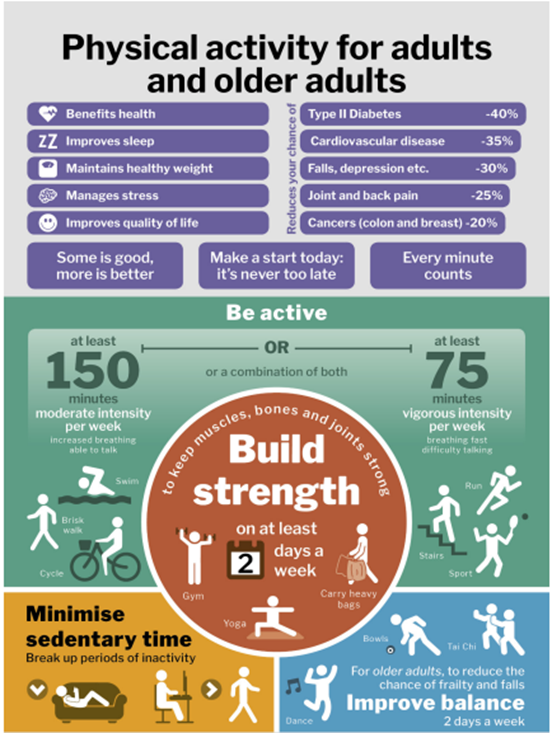How does exercise help?
Your cancer treatment will put stress on your body. Your body will cope better if fit.
You can train your body for treatment the same way an athlete trains for sport. Exercise will help improve your fitness in a few weeks.
Being more active can mean:
- less time spent in hospital
- a quicker recovery after surgery
- fewer side effects from chemotherapy and radiotherapy
- less chance of complications, like chest infections or blood clots
How much exercise should I do?
The NHS has information about exercise. The image below shows how much each adult should have:

Try to be active every day with less sitting. Each week, aim for at least 150 minutes of moderate intensity activity. Moderate intensity exercise makes you breathe somewhat harder than normal.
If you're doing high intensity exercise, aim for about 75 minutes. High intensity exercise makes you breathe harder than normal.
You can also do a combination of moderate and high intensity.
Moderate intensity activity:
- brisk walk
- dancing
- gentle swim
High intensity activity:
- jogging
- swimming
- cycling
It is advised to include a warm-up and a cool-down, including a stretch.
Complete strengthening exercises at least twice per week.
Am I doing too much exercise?
Remember to be realistic about your goals and exercise safely. Slowly build up the exercise you do.
Please stop exercise and seek medical advice if you get:
- chest pain
- very short of breath
- dizziness
- blurred vision
- severe pain
How much activity is right for you?
The following advice is from Macmillan's website: Physical activity and cancer | Macmillan Cancer Support
Which type of activity you do, and how much you do, will depend on the following:
-
How fit you were before you were diagnosed
-
The type of cancer treatment you had or are having. This may affect what is safe for you to do and what you can manage
-
Any symptoms or side effects you have
-
Any long-term conditions you have, such as heart problems or lung problems
-
Whether you have long-term effects of the cancer or its treatments. This might include bone problems, lymphoedema, peripheral neuropathy, heart problems or bladder problems.
You might want to speak to your cancer doctor or specialist nurse about what is right for you. They can give you advice, or they might refer you to a physiotherapist or cancer exercise specialist.







